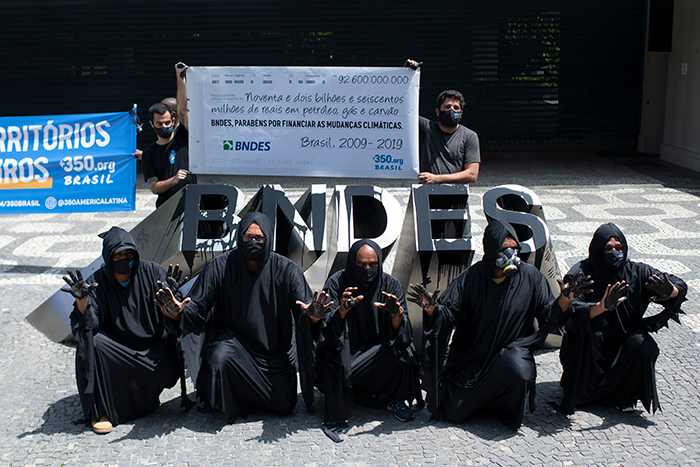
PHOTO: Landau | 350.org Brazil and artisanal fishermen from AHOMAR denounce the BNDES’ high investments in fossil fuels in a demonstration.
The BNDES (National Bank for Economic and Social Development), one of the largest financiers of infrastructure projects in Brazil, has decided that it will no longer provide credit for coal-fired power plants, and the sector was formally put on the bank’s exclusion list.
In an interview with Reset magazine, the newly initiated director of productive and socio-environmental credit, Bruno Aranha said:
“We will no longer finance coal-fired thermal plants, regardless of the technology employed or anything else”
As a consequence of the exclusion of thermal power plants, coal mining projects aimed at supplying them will no longer be eligible for credit from the bank either.
Putting coal on the list was a first step.
“We are reviewing our exclusion list of activities that we don’t support financially. Coal was the main innovation so far, but we are studying other possibilities,” says Aranha, who, besides the new board of directors, coordinates a project to adjust the bank’s governance to the ESG agenda. “The idea is for the BNDES to be prepared and always evolving to be a relevant player in sustainable development.”
For Ilan Zugman, director of 350.org Latin America, this decision was a great victory for climate policy in Brazil.
“This is an incredible victory for Brazil. Last year we denounced in front of the BNDES headquarters the absurd investment of more than 92 billion reais in fossil fuels. That is money that was invested to accelerate climate change and harm local communities,” celebrated Zugman.
“It is urgent that the BNDES and other banks implement more aggressive targets to decarbonize their portfolios, stopping “burning” citizens’ money in sectors that only worsen the climate emergency and concentrate profits in the hands of a few large companies. Either we turn off the tap to the polluters or we will suffer even more from the consequences of global warming,” concluded the activist.
For now, the oil and gas segment is still eligible to receive resources, but Aranha says that the policy is not limited to excluding the most controversial sectors. He hints in his speech at the intention to force the energy market to rethink its footprint and increase the renewable energy portfolio.
It is also worth mentioning that Idec, the Brazilian Consumer Defense Institute, together with Conectas Human Rights, Sou da Paz Institute and World Animal Protection, have for many years been developing an important piece of work to evaluate and pressure banks for better socio-environmental policies – the Responsible Banking Guide – with the objective of offering consumers a panorama of what financial institutions do with their money, what kind of companies they finance, and whether they consider aspects such as, for example, deforestation, respect for human rights, and labor relations.
The results of the Brazilian banks are low, but in the survey, BNDES is considered the “least worst”, ahead of Santander, Banco do Brasil, Bradesco, BTG Pactual, BV, Caixa, Itaú, Safra, among others. Surely this clear positioning on coal investment will make the bank stand out, and we hope it is pulling a trend in the market.
We at 350.org celebrate, but we will continue to be alert and demand more! We need to divest from fossil fuels, NOW!
Check out the demonstration in front of BNDES:
More about this (in Portuguese):
Activists ask BNDES to end fossil finance
Brazilian banks still financing fossil fuels despite climate change impacts